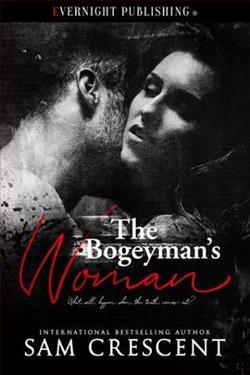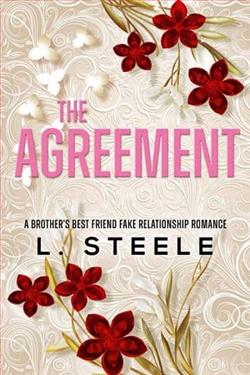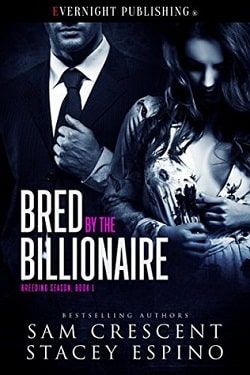Page 57 of Going Home in the Dark
“I don’t know how many genes we have—thousands, I guess—but the possible number of genotypes is almost infinite. They think at least a hundredbillionpeople have been born, and no two were alike except for identical twins. Hornfly always says ‘we’ or ‘us,’ never ‘I’ or ‘me.’ Yet he refers to his kind as a ‘genotype.’ A genotype isn’t a species. It’s always and only a unique organism. Human beings are a species, each human being is a unique genotype.”
As he listened, Spencer understood why he had become an artist instead of a scientist. “But what does all this mean?”
Rebecca said, “What itseemsto mean is that Hornfly and those ten naked men in the basement and the creature that was molting in Ernie’s house are all part of one organism, one consciousness, that can manifest in different forms, a colony of individuals that act as one. And they—it—lives among us. Or more likely under us, as it seems to move around through drains. When the manifestation calling itself Hornfly says it’s not ‘a pussy-willow genotype like another I could name,’ I think it means there is a second creature similar to it, and they’re some kind of rivals.”
Bobby was impressed. “You got all this info about genetics from your phone while Spencer was losing at arm wrestling?”
“No, no. As soon as I got a firm definition of ‘genotype,’ all the rest came together for me. I’ve just been refining it in my mind before dropping it on you.”
“How is that possible? How could you figure that out from just the definition of ‘genotype’?”
“I was up for the female lead in a big-budget flick based on something Michael Crichton scribbled on an index card that was found after his death. The idea was on one side of the card, and on the other side he had written ‘bigger thanJurassic Park.’ It was about genetic engineering, so I studied the subject at the time. During a development process that took four years, there were nine writers and three directors who worked on it, but Michael was a very smart man, and no one in the biz seemed to have the brain power to figure out what he meant.”
“Wow,” said Spencer, “that’s a lost opportunity that must have given you some sleepless nights.”
“For sure. Especially because I was in for eight percent of the gross from first dollar.”
Bobby said, “Yeah, okay, but all this seems to leave us with even more questions than before. And what, if anything, does this tell us about why there’s no crime in Maple Grove anymore? Or why Ernie is in a coma or suspended animation or whatever the hell he’s in?”
Spencer regarded Rebecca expectantly, apparently assuming that from now on she would be a fountain of unassailable theories, but he was to be disappointed.
She said, “I don’t know yet.”
“And who locked away our memories, and how did they do that, and why are they now unlocking them?” Bobby asked. “And where is Hornfly? And why didn’t he deal with us when we were kids, like he threatened to do that night in the pavilion? In fact, since his goal—their goal, its goal, whatever—is to destroyhumankind, why hasn’t that war begun? Why hasn’t it begun at least here in Maple Grove?”
They stood in a silence of profound befuddlement.
As the world continued to turn, it seemed the pavilion did not turn with it, as if time had stopped inside this fanciful structure, as if the pavilion were the stable core of the universe from which all reality was generated and set in motion. For clarity, a point needs to be made: The pavilion wasnotin fact the stable core of the universe from which all reality was generated. That is only how itfeltto the three amigos who were befuddled by urgent questions for which they desperately needed answers if they were to survive. You see, their inability to think their way through the maze of questions rendered them mute, left them paralyzed by dread and by recognition of the depth of their ignorance. This, of course, is a condition of brief duration; they will not be standing in the pavilion for the remainder of the story.
So the leaves of the surrounding maple trees fluttered in the summer breeze, and songbirds graced the sky, and people walked their dogs, and the amigos remained frozen in perplexity. One can hardly imagine a circumstance in which they would be more vulnerable to the sudden arrival of Britta Hernishen. However, they were not at the moment subjected to that ordeal. Abruptly, as one, they said, “The hospital!” That exclamation brought an end to their paralysis but did not fully cure their befuddlement.
They looked at one another, expecting someone to say something more definitive about the hospital, but that brief cry was the whole of it.
“What? What about the hospital?” Bobby asked in frustration. “Who put those words in our minds? How did they do that?Are we supposed to go to the hospital? What do we do when we get there?”
Before Bobby could ask enough questions to cast them into paralytic befuddlement again, Rebecca said, “Something happened there. It was around Thanksgiving that year. No, not ‘around.’ It was smack-dab on turkey day.”
“What year?”
“The year of Hornfly. A few weeks after that Halloween night when he ate Björn Skollborg.”
Spencer said, “He probably ate Björn’s wife that same night.”
“Karamia,” said Rebecca. “You think he could eat two people in one evening?”
“The way that geek chewed into Björn’s head, he could probably eat as many as he wanted to.”
Bobby the Sham was always listening not only to what people said but also to how they said it. He believed that a good novelist needed to be a keen observer of diction and idiom in order to create believable dialogue. Even in the current circumstances, with peril waiting around every corner, he found himself wondering exactly how he would convincingly portray those exchanges between Spencer and Rebecca if this were a novel he was writing.
“It’s not possible,” he said.
Spencer said, “How do you figure? I mean, if I can easily eat two cheeseburgers at a sitting—and I can—why couldn’t a creature like Hornfly eat two people?”
“I wasn’t referring to eating people,” Bobby said. “I was just thinking about ... Never mind. Listen, the three of us thought of the hospital at the same time, but the rest of the memory seems to be returning in dribbles, not all at once like before. So maybe we’re beginning to remember things on our own.”
“Britta doesn’t believe in Thanksgiving,” Spencer said.
Bobby frowned. “Britta doesn’t believe in anything but Britta.”















